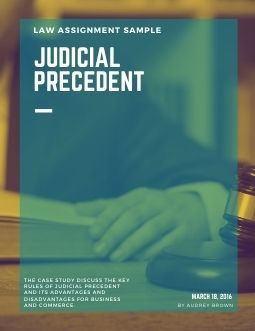
You can download the sample Law case study on Judicial Precedent Questions with the following question for free at the end of this page. For further assistance in Law Assignment help, please check our offerings in Law assignment solutions. Our subject-matter experts provide assignment help essays to law students from across the world and deliver plagiarism free solution with a free Turnitin report with every solution.
(AssignmentEssayHelp does not recommend anyone to use this sample as their own work.)
Law Assignment Question
Discuss the key rules of judicial precedent and its advantages and disadvantages for business and commerce.
Law Assignment Solution on Judicial Precedent
Introduction
Judicial precedent mandates that there be a hierarchy of courts to help take care of issues. Judicial precedent, in its outright meaning, makes a previous decision of one court be binding on a lower court. The concept of stare decisis plays a role here. In other words, if a higher court has decided on a case and another similar case comes up at a lower court, the lower court will treat the case alike and pass the judgment exactly as done by the higher court. This is because the previous judgment had set a precedent for the lower court and the lower court is bound to follow the precedent as such, as long as the case can be treated on a similar platform like the one decided earlier by the higher court…
Read more in the complete solution PDF document at the end of this page.
Australian Scenario
In Australia, the case of Farah Constructions v Say-Dee [2007] HCA 22 was an important one, since when the Justices ensured that the power of lower courts to develop law was regulated and controlled. The Farah v Say-Dee case had the High Court reversing the judgment of the Court of Appeal. The point of contention that came along here was significant – if the High Court considers certain facts that were not really necessary for reaching the outcome of the case, but in its judgment, writes down the rationale and it exists, then other Australian courts are bound by it accordingly. This was the guidelines mentioned (in Bofinger v Kingsway Group Ltd [2009] HCA 44, [86]) as well.
The Farah case brings into statement that Courts need to consider 'seriously considered dicta' as well, or rationale that is not necessary for the outcome of the present case. There have been doubts, of course, of the effectiveness of this and Justice Kirby had stated his apprehensions in R v Keenan [2009] HCA 1, where he stated his concern as to how much lower courts will be bound by something that's not in the true sense, ratio decidendi of the case…
Read more in the complete solution PDF document at the end of this page.
Key Principles
Some of the key principles governing the judicial precedent are below:
1. Consistency
The legal reasoning applied to by an earlier court of the higher authority has to be respected and followed.
2. Hierarchy
Not every court is expected to listen to the judgments passed by another court. Only a lower court is expected to adhere to the judgment passed by the Higher Court. In other words, judicial precedent only works in a lower court, which is bound by the decision of the higher court.
3. Bound by own decision
Normally, even the appellate court is bound by its own decision in a previous case. However, this is not a must and is of a persuasive value. If need be, the appellate court can apply legal reasoning in a different way, should it feel the need to do so…
Read more in the complete solution PDF document at the end of this page.
Advantages and Disadvantages for Business and Commerce
Business and commerce, of any country, needs to be certain about processes and the results of particular actions. While laws and rules relating to business are often an indicator of how the businesses are trying to shape up their economic activities in the country, there are certain advantages and disadvantages that the doctrine of precedent bestows upon businesses and Commerce. Here is a look at some of them.
Advantages
Businesses and commerce can take the legal recourse easily if they know that the doctrine of judicial precedent will act in their favour. Here is a look at some of the advantages of the judicial precedent.
1. Certainty – With certainty, businesses know what to expect from certain actions. Previous judgments on a similar competitor would enable businesses to be clear about the law as well as help them take the proper legal recourse should they feel their legal rights have been infringed.
2. Consistency – The business world is itself unpredictable and any business would be looking forward to consistency and fairness, something that the doctrine of judicial precedent brings to the table by its virtue. Businesses can know that their legal case would be dealt with in the same way as any other and there would be no prejudice or different legal reasoning applied…
Read more in the complete solution PDF document at the end of this page.
Conclusion
Judicial precedent presents a way for businesses to be surer of court decisions and understand the different legal nuances. It helps the courts to dispose of cases easily and not worry about spending money on court expenditure unnecessarily. Except from renewing faith in the Judicial system, it also helps Australian businesses to be more sure of the law of the land.
(Some parts of the solution has been blurred due to privacy protection policy)


 WhatsApp Us
WhatsApp Us